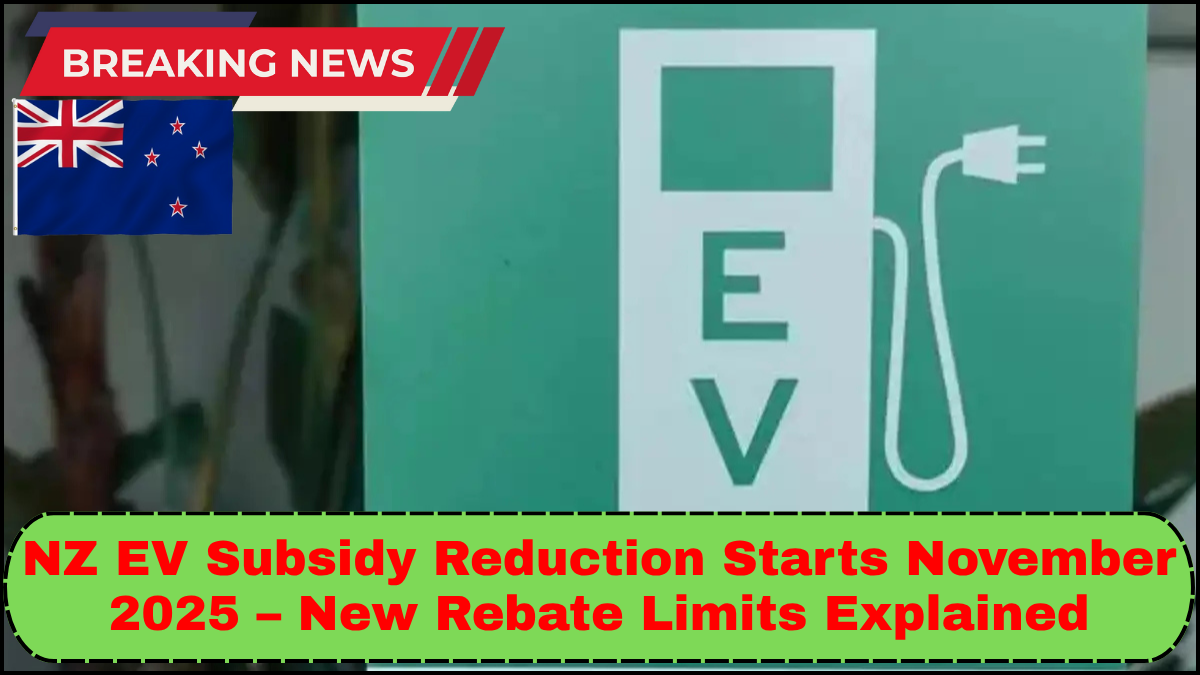Starting November 2025, the landscape for electric vehicle buyers in New Zealand will shift significantly. The government has confirmed the NZ EV subsidy cut, marking a major policy update in the nation’s transition to cleaner transport. This upcoming change will reduce the rebates currently available to EV buyers and reshape the market dynamics for dealers, consumers, and importers alike.
Here’s what you need to know about the new rebate structure, how it compares to the current scheme, and what it means for future EV ownership in New Zealand.

What’s Changing in the EV Rebate Scheme?
Currently, buyers of new electric vehicles in NZ benefit from rebates of up to $7,015 for fully electric vehicles (BEVs) and up to $4,025 for plug-in hybrids (PHEVs). These incentives, introduced under the Clean Car Discount scheme, have significantly increased EV adoption since their inception.
However, as of November 2025, the government will implement a revised rebate structure, with the following changes:
-
Rebate for new BEVs will be reduced to $3,500
-
Rebate for new PHEVs will drop to $1,500
-
Used imports will receive no more than $2,000 (previously up to $3,500 for used BEVs)
The reason for this move, according to the Ministry of Transport, is to ensure the subsidy remains fiscally sustainable while continuing to encourage cleaner vehicle choices.
Why Is the NZ EV Subsidy Being Reduced?
The NZ EV subsidy cut confirmed for November 2025 is part of a broader recalibration of government spending on climate-related initiatives. Officials cite several contributing factors:
-
Budgetary Constraints: With mounting economic pressures, the government aims to prioritize funding across a wider range of infrastructure and environmental programs.
-
Market Maturity: The EV market in New Zealand is no longer in its infancy. More models are now available, and public interest has grown, lessening the need for aggressive incentives.
-
Shift Toward Road Pricing Models: Discussions are also underway around introducing EV road-user charges, potentially replacing some aspects of the current rebate system in the future.
Impact on Buyers and the EV Market
The reduction in subsidies will likely impact both consumer behavior and industry strategies. Here’s what we can expect:
-
Buyers may fast-track purchases ahead of the November 2025 deadline to capitalize on higher rebates.
-
Dealerships and importers could experience a surge in sales in late 2025, followed by a possible dip in early 2026.
-
Lower-income households, who rely on rebates to afford EVs, may find the reduced support a setback.
-
Used EV imports, particularly popular among budget-conscious consumers, will feel the pinch with shrinking rebates.
Despite these shifts, the government has reiterated its long-term commitment to electrification. While electric vehicle subsidy NZ amounts may be shrinking, other supportive measures like public charging infrastructure expansion and cleaner fleet mandates will continue.
Strategic Recommendations for EV Shoppers
If you’re considering an EV purchase, timing and planning will be crucial over the next 18 months. Here’s how to make the most of the transition period:
-
Act Early: If you’re eyeing a new or used EV, consider purchasing before November 2025 to maximize your rebate.
-
Compare Models: With new EVs entering the market regularly, look beyond the most popular brands—some newer entrants may offer better value for money.
-
Look for Dealer Incentives: Dealers may introduce promotions to offset the subsidy reduction and retain buyer interest post-cut.
-
Evaluate Total Cost of Ownership: Even with lower rebates, EVs still offer long-term savings on fuel and maintenance.
FAQ – NZ EV Subsidy Cut and Rebate Update
Q1: When will the EV subsidy changes take effect in New Zealand?
A: The updated rebate limits will be enforced starting November 2025.
Q2: How much will the new EV rebate be after the reduction?
A: The new rebate for new fully electric vehicles will be $3,500, while plug-in hybrids will qualify for $1,500. Used EVs will see a cap of $2,000.
Q3: Why is the NZ EV subsidy being cut?
A: The cut is driven by economic constraints, market maturity, and an evolving focus on sustainable transport funding models.
Q4: Will the Clean Car Discount end completely?
A: No. The discount will remain, but with reduced rebate values. Other support measures for clean transportation will continue.
Q5: Should I wait or buy an EV now?
A: If maximizing your rebate is a priority, buying before November 2025 is advisable. Otherwise, compare long-term ownership costs and incentives post-subsidy.
click here to learn more